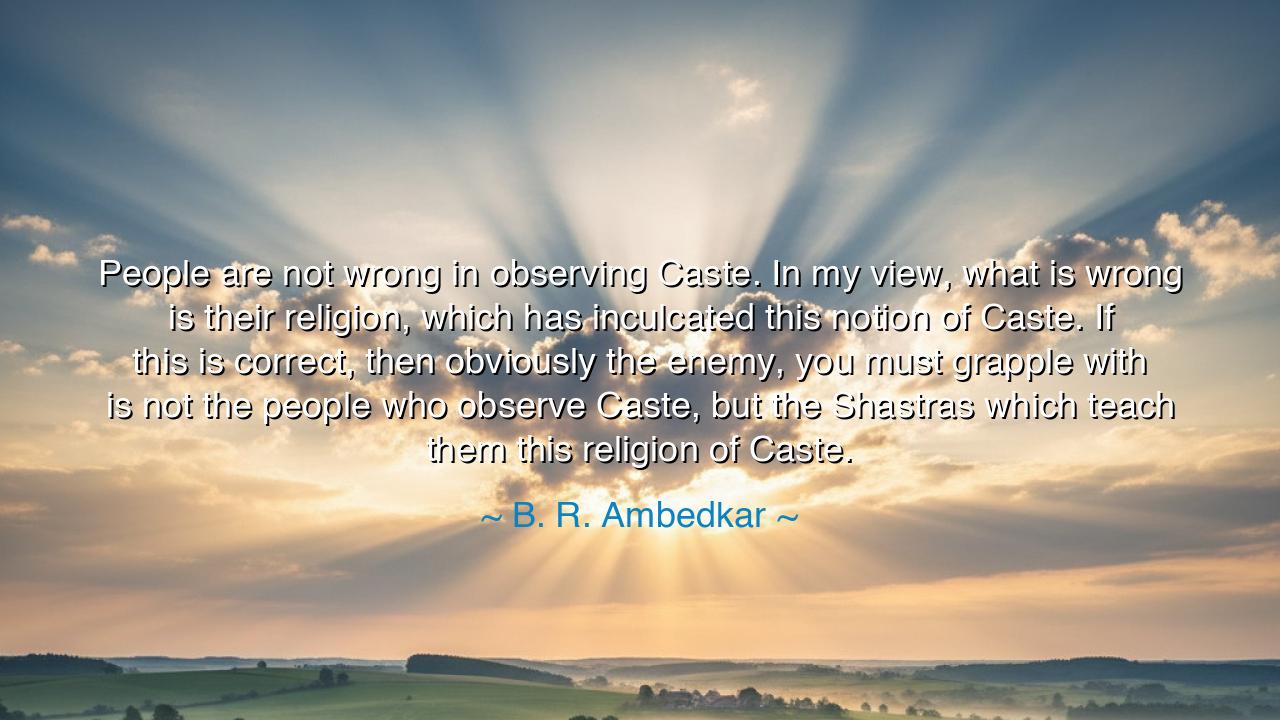
People are not wrong in observing Caste. In my view, what is
People are not wrong in observing Caste. In my view, what is wrong is their religion, which has inculcated this notion of Caste. If this is correct, then obviously the enemy, you must grapple with is not the people who observe Caste, but the Shastras which teach them this religion of Caste.






B. R. Ambedkar, a great champion of social justice, stands as a towering figure in the fight against caste-based discrimination in India. His words—"People are not wrong in observing Caste. In my view, what is wrong is their religion, which has inculcated this notion of Caste"—strike at the very heart of a society entrenched in ancient systems of inequality. Ambedkar, himself born into the untouchable caste, recognized the deep roots of Caste in the religious doctrines and philosophies that governed the lives of millions. He understood that to change the system, one must challenge the very beliefs that perpetuated it. Caste, he taught, is not merely a social or cultural construct—it is a religious edifice, built upon doctrines that were entrenched in the ancient Shastras, the sacred texts that governed life in India.
The concept of Caste is as old as the Vedas themselves, a system that divided society into rigid, hierarchical categories. Ambedkar acknowledged that the people who observed Caste were not inherently evil or malicious, but rather victims of a deeply ingrained belief system. This belief system, he argued, was not natural, nor was it born of social experience. It was created and perpetuated by the religion and its sacred texts, which shaped people's minds and perceptions of one another. The Shastras, with their divine authority, enshrined the idea of Caste as not just a social fact, but a divine order—an unchangeable truth ordained by God. To Ambedkar, the true battle was not with the people who followed these teachings, but with the religion that had embedded these notions of inequality into the sacred doctrines.
In the great epics of the past, such as the Mahabharata and the Ramayana, we find traces of Caste embedded in the very fabric of society, where the actions of the gods themselves reflect the social divisions of the time. The ancient Aryans, whose religious and cultural practices shaped the foundation of Hinduism, believed in the divine sanction of these divisions. But Ambedkar, with the insight of a great reformer, recognized that these beliefs were not eternal truths. They were inventions of society, woven into the sacred texts to maintain power structures that favored the few and oppressed the many. To him, the battle was not against those who observed Caste—for they were simply following a system of belief that had been ingrained into their very consciousness—but against the Shastras themselves, which upheld these oppressive ideas.
Consider the story of the great philosopher Socrates, who, in ancient Greece, saw that the beliefs of the people were often shaped by tradition and authority. Socrates questioned the accepted norms, arguing that true wisdom came from critical thought and examination of belief. Just as Socrates challenged the beliefs of his time, Ambedkar sought to challenge the religious and philosophical foundations of Caste. Socrates’ pursuit of truth was rooted in the belief that humans could transcend their inherited beliefs through reasoning and critical inquiry. Similarly, Ambedkar believed that reason and education were the keys to undoing the oppressive beliefs that had held the masses in bondage.
Ambedkar’s words resonate as a call to action—a call to challenge the very foundations of belief that uphold systems of inequality. To fight against Caste is not merely to oppose a social hierarchy, but to redefine the philosophical and religious structures that support it. His message is clear: beliefs are powerful, but they are not infallible. They can be questioned, examined, and ultimately transformed. If the Caste system is to be eradicated, we must not merely call for social reform, but for a revolution of thought, a reimagining of religion itself—one that recognizes the inherent equality of all human beings, regardless of their birth or social standing.
The lesson of Ambedkar’s words is one of deep reflection and action. We must examine the beliefs that shape our society—whether they come from religion, tradition, or culture—and recognize their role in perpetuating systems of oppression. To challenge these systems, we must not only oppose their outward manifestations, but we must also question the beliefs that sustain them. Just as the Shastras once enshrined the notion of Caste, so too can a new set of values—founded on the principles of equality, justice, and human dignity—reshape the future.
In practical terms, this means challenging not only the social structures that uphold Caste, but also the religious doctrines that reinforce them. It means educating ourselves and others, questioning long-held beliefs, and building a society based on principles that affirm the worth of every individual, regardless of their birth. This is the path that Ambedkar set before us, and it is one that we must walk together, with the courage to face the truth and the will to transform the systems that divide us.






AAdministratorAdministrator
Welcome, honored guests. Please leave a comment, we will respond soon